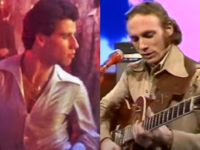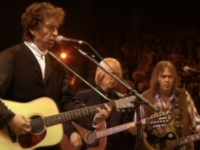Neil Young still seems pained over the difficult times endured by the legendary 1960s band Buffalo Springfield, returning to the theme again and again in his new autobiography Waging Heavy Peace
Seemingly cursed from the first, Buffalo Springfield was more influential than it ever was consistent, recording just three albums in its heyday, then seeing a long-awaited recent reunion scuttled when Young took up with frequent collaborators Crazy Horse again.
The Rock and Roll Hall of Famers in Buffalo Springfield, which have only officially been together six years since the mid-1960s (1966–68 and 2010–12), also included Richie Furay, Ken Koblun, Dewey Martin, Jim Messina, Bruce Palmer and Stephen Stills. Young would later play with fellow hall of famers Crosby Still Nash and Young; Furay would start Poco and Messina would team up with Kenny Loggins.
[SOMETHING ELSE! REWIND: Here’s a sneak peek into the forthcoming ‘Psychedelic Pill,’ the fiery new rumination on the death of the 1960s from Neil Young and Crazy Horse.]
Fast forward to 2010, and Furay, Stills and Young reunited as Buffalo Springfield for the Bridge School benefit, the first time they’d appeared under the band name in four decades. The late Martin was replaced by drummer Joe Vitale (Joe Walsh, CSN), while Young’s bassist Rick Rosas took over for the late Palmer. An appearance at 2011’s Bonnaroo music festival followed, sparking talk of the prospect for a full-fledged Buffalo Springfield reunion. But it wasn’t to be, as Young would go on to product a pair of 2012 projects with Crazy Horse, the standards-redo Americana and the forthcoming Psychedelic Pill.
In a new talk with Alexis Petridis of The Guardian, Young ruminates on the lost promise of his other Rock and Roll Hall of Fame band.
“It just seemed like it never reached its potential,” Young says. “There was always something wrong, always somebody missing, always some kind of conflict, always a problem. It stopped us from being as great as we could be, and we didn’t know how to deal with it and so we really didn’t quite succeed.”
The band famously lost its bass player when Palmer was deported back to Canada after a run-in with police involving a LSD-fueled trip — literally — down the Pacific Coast Highway without a license: “We lost what made us great, and when we got the chance to record with the band in the first place we didn’t have anyone good to take us into the studio and make the best of what we were. Two of the guys are no longer with us, so it’s difficult, but we’re yet to do something that –,” Young says, before his voice begins to trail off. “You never know.”
Click here to purchase …
- Ernesto Cervini’s Turboprop, “When I Fall” (2024): Video premiere - March 15, 2024
- Disaster Pony,“Dead Neon & The Noon Sun” from ‘Disaster Pony’ (2024): Video premiere - February 27, 2024
- Christopher Hoffman, “Farewell Forever” from ‘Vision Is The Identity’ (2024): Streaming premiere - February 19, 2024








